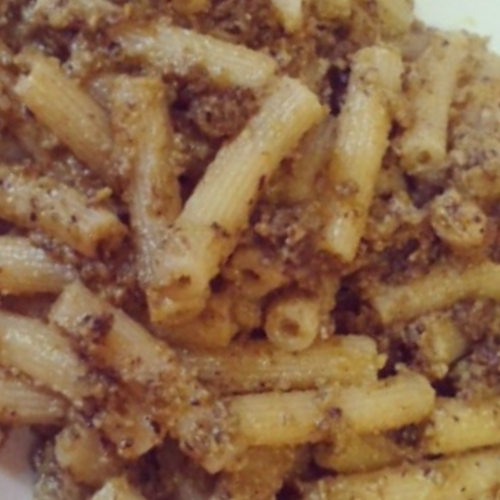Method:
Step 1: Prepare the Pasta
Boil the pasta: In a large pot of salted boiling water, cook your pasta according to the package instructions, usually about 8-10 minutes for al dente.
Reserve some pasta water: Before draining, reserve about 1 cup of the pasta cooking water. This will help thin the pesto sauce and allow it to coat the pasta better.
Step 2: Make the Pistachio Pesto
Blend the ingredients: In a food processor, combine the pistachios, basil leaves, garlic, Parmesan (if using), and lemon juice.
Add olive oil: Pulse until the mixture becomes a coarse paste. Gradually stream in the olive oil while the processor is running to create a smooth pesto. If the pesto is too thick, add a tablespoon or two of the reserved pasta water or extra olive oil to adjust the consistency.
Season: Taste and season with salt and pepper as desired. The lemon juice will add a fresh zing that balances the rich flavor of the pistachios.
Step 3: Combine the Pasta and Pesto
Toss the pasta: Once the pasta is done and drained (but still warm), return it to the pot or a large bowl. Pour the pistachio pesto over the pasta, adding a little of the reserved pasta water as needed to help the pesto coat the noodles evenly.
Mix well: Toss the pasta and pesto together, ensuring every strand is well-coated with the creamy, flavorful pesto sauce.
Step 4: Serve and Garnish
Plate and garnish: Serve the pasta in individual bowls or on a large platter. Drizzle with a little more olive oil, and garnish with extra chopped pistachios, fresh basil, or Parmesan (optional).
Enjoy: This dish is best served warm, but it’s also great at room temperature if you're preparing ahead.
Variations & Tips:
Dairy-Free Version: Omit the Parmesan cheese or substitute with a dairy-free cheese or nutritional yeast for a vegan-friendly alternative.
Add Protein: You can add grilled chicken, shrimp, or even crispy pancetta for an extra boost of flavor and texture.
Nuts: If pistachios are too expensive or hard to find, you can use almonds, walnuts, or cashews as a substitute. The flavor will differ, but the result will still be delicious.
Make Ahead: This pesto can be made ahead of time and stored in an airtight container in the fridge for up to 3 days. Just add a little olive oil or pasta water to loosen it up before using.
Pasta Alternatives: Try using whole wheat or gluten-free pasta to make this dish fit specific dietary needs.
